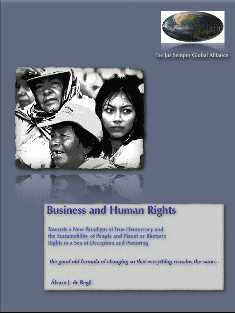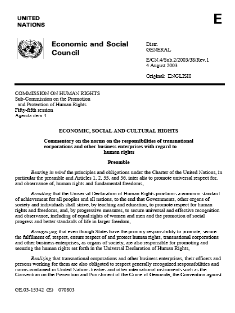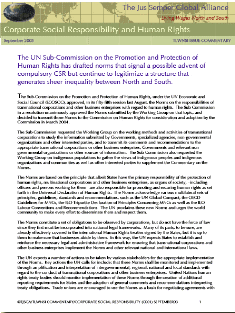Performance of the UN regarding the responsibilities of business on the impact of their activies on Human Rights The debate generated by the impact of business activity on the respect of HR has developed mostly within the bureaucracies of the UN and the EU, or has been aimed at them, with States pushing their views within these organisations or simply keeping a low profile. Although the debate has been going on for decades, it is since the publishing of the draft of the UN Norms for Business and HR that it has intensified, reflecting the growing pressure that civil society is exerting worldwide to harness business practices. Two sides have clearly emerged from this debate.
The central case of the UN Norms
As is foreseeable, multilateral organisations, governments of many States, businesses and business organisations oppose the Norms, whilst the greater part of organised civil society, including many scholars, legal practitioners and consultants on the matter support them. - Positions in favour. Succinctly, those who support them share the consensus that the Norms, considering the current neoliberal context and the available CSR resources, are a clear step forward, legitimate and with authority, towards a legal framework to govern the impact of business on HR. This position has been clearly expressed by highly-credited organisations such as Amnesty International and the International Federation of HR (FIDH), as well as by thousands of social organisations, including consumer organisations and HR professionals worldwide. Standing out, singularly, is the decision of the group of MNCs, of the previously mentioned BLIHR, that, in contrast with the vast majority of businesses, did not reject the Norms from the start, and, in turn, decided, since the end of 2003, to put them into practice for several years to assess the results.
- Positions against. Those opposing the draft of the Norms allege that it represents a major change departing from voluntary adherence of business to HR norms and that this change has not been demonstrated. It is argued as well, with a legalist tone, that many of the Norms have not been ratified by many States and that the Norms attempt to adjudicate to business responsibilities exclusive of States. Main objectors of the Norms, besides many companies and business guilds, were the International Chamber of Commerce and the International Employers Organisation (IEO), two major global “pinnacle” business organisations.
The Work of the Special Representative on Business and Human Rights
To be sure, the reason why the UN Secretariat General appointed Mr. John Ruggie Special Representative to the Secretary General on Business and HR was the open polarisation, which persists today. Mr. Ruggie, Professor at the Kennedy School of Government of Harvard University, immediately applied himself to fulfil his mandate which, as he himself describes it, is about the effort to clarify the topic of business and HR; identifying, clarifying, researching and elaborating to compile compendia and develop materials on the subject. Moreover, he is asked to make recommendations with the goal of strengthening the promotion and protection of HR in the field of business. Furthermore, he is asked to go beyond the legal sphere and evaluate the policies and best practices of States and business and even conceive methodologies for the assessment of the impact of business activity on HR. Mr. Ruggie's mandate, which began in 2005 for a period of two years, was extended until 2011 for a total of six years. Up to the spring of 2008,he has issued three reports major reports.
To access the work of the Special Representative on business and Human Rights click here.

To access our full assessment on the responsibility of business on Human Rights click here or on the report cover.
Commentary on the UN Norms Draft
COMMISSION ON HUMAN RIGHTS. Sub-Commission on the Promotion and Protection of Human Rights. Fifty-fifth session The Sub-Commission on the Promotion and Protection of Human Rights, under the UN Economic and Social Council (ECOSOC), approved, in its fifty-fifth session last August, the Norms draft on the responsibilities of transnational corporations and other business enterprises with regard to human rights. The Sub-Commission in a resolution unanimously approved the Norms submitted by the Working Group on that topic, and decided to transmit those Norms to the Commission on Human Rights for consideration and adoption by the Commission in March 2004. 
Click here to Download the Norms draft and Commentary or on the commentary cover.
TJSGA's commentary on the UN Norms draft
The UN Sub-Commission on the Promotion and Protection of Human Rights has drafted norms that signal a possible advent of compulsory CSR but continue to legitimize a structure that generates sheer inequality between North and South.an rights.

Click here to Download our full commentary on the Norms draft (or on the commentary cover).
|











